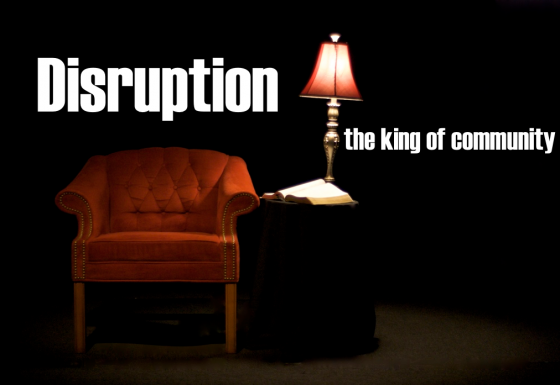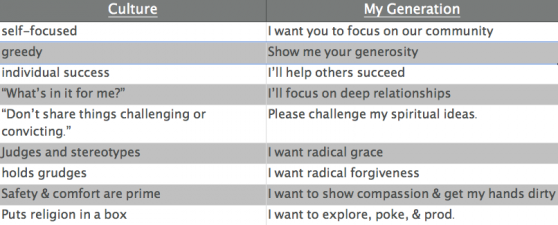Ever feel like you’re further from God now than you were a few months ago? Maybe you had that deep sense of awe before God in every aspect of life…and now it is as if that moment in time was just a whisper.
As the theologians “The Righteous Brothers” penned
You’ve lost that loving feeling
Whoa that loving feeling
You’ve lost that loving feeling
Now it’s gone…gone…gone…who-oh-oh-oh-oh
Though they may not have directly been speaking to their spiritual lives, it seems an apt description of our relationship with God in different seasons. We felt close to God…then we wonder where that closeness has gone, gobbled up by life, kids, careers, hobbies, “religion,” and even by our spiritual disciplines.
Now it’s gone.
And the answer to getting it back isn’t found in trying harder. Because the harder you try, the further you’ll find yourself from the presence of God. A lack of feeling isn’t fixed by a mere flurry of doing.
My friend Jamin Goggin, with Kyle Strobel, has written a book that addresses just this issue. It’s called Beloved Dust: Drawing close to God by discovering the truth about yourself. It’s really good, striking a hard-to-find balance between being rich, full, thoughtful, deep…and being accessible and helpful and readable. Many books aim at, but few find that balance.
I asked Jamin a few questions about the book, and I think you’ll find his answers helpful.
Ben: What are some of the most common ways you see people try to get closer to God? What’s so empty about those pursuits?
Jamin: In Beloved Dust, Kyle and I explore common ways that Christians seek to grow in their relationship with God. We argue that some of them actually lead us down the wrong path. Ultimately, they are the result of very sneaky idolatries. One of these idolatries for example is “experience.” What we have found in our own journey is that it is incredibly easy to worship an experience from God rather than God himself. Often times we hit seasons in our spiritual life that feel dry. Worship feels boring, the Bible is uninteresting to us or maybe we just feel bored in prayer. We don’t like this feeling of disconnect from God and malaise in our spiritual life, so we look for solutions. We want to feel the way we used to feel in prayer or at church. This may lead us to try a new technique in prayer or maybe we will find ourselves looking for a new church that can make our spiritual life feel exciting again. Whatever it may be we are on the hunt to get back those old feeling we used to have. We want excitement. We want a “mountain top high”. We want an “aha moment”. The problem of course is that we don’t truly want God himself, but rather a felt experience. We want God for how he makes us feel. Thus, rather than going on the hunt for those old feelings or trying to generate an experience for ourselves, the call of God is to be honest with him about how we feel. Quite often God leads us into these kind of desert seasons precisely to show us our idolatry for experience. He is inviting us into a mature love, which does not love for what we get, but for who God is.
Ben: What’s something that a person could do right now to begin actually growing deeper in their relationship with God?
Jamin: What we are seeking to emphasize in Beloved Dust is that all of life is to be lived with God. We seek to dispel the notion that there are some activities that are “spiritual”, while most of our lives are lived on our own. Rather, our hope is to cast a vision of life with God that points people into communion with him in their work, their play and their home. The Christian life is about being with God who is always with you. As a result, the primary way we grow in intimacy with God is prayer. Prayer is our means of being with God at all times. Prayer is not merely another spiritual discipline, but is the very heartbeat of the Christian life. That being said, let me take a stab at actually answering your specific question. As we cultivate the habit of praying (being with God) in our everyday lives there are certain habits of heart that we can practice in prayer to grow in our relationship with God. Habits of heart are relational postures we embrace while we are praying. For example, one habit of heart is honesty. If we desire to grow in our relationship with God then we need to cultivate the practice of being honest with God; inviting him in to the truth of our heart amidst the vicissitudes of our everyday life.
Ben: There’s a tension between “doing” and “being.” Is it possible to find “being” in the “doing”? How?
Jamin: Great question. I actually prefer the language of “being with.” This denotes communion with God. Not just “being”, but “being with.” I think when we use the dichotomy of “being” vs. “doing” we often tend to be imagining very polarizing opposite ends of the spectrum. On one side is the person who is constantly self-reflecting or contemplating. While on the other side is the person who is constantly getting things done and is active for the kingdom so to speak. I think this is a false dichotomy. Jesus makes this clear as he talks about the importance of abiding in relationship with him in John 15. What is clear is that “being with” does proceed “doing for”. The heart of the gospel is not activity for God, but communion with God. However, what is also made clear in John 15 is that if we truly are abiding in Christ then we will indeed be active for the kingdom. Our “doing” so to speak is the fruit of our “being with.” As we participate in the love of Christ we share the love of Christ.
Ben: Is it possible to have a fully-realized prayer life on our own? What part does community play in our closeness with God through prayer?
Jamin: Community is unquestionably crucial in the Christian life. Often I hear the language of “context” when talking about Christian community. It is the “context” in which we grow in Christ. I think this is fine, but I think it misses the depth of what Christian community truly is. Participation in the love of God in Christ by the Spirit is not merely an individual endeavor. As those who are in Christ, the Holy Spirit now lives within us, pointing us on to Jesus and inviting us into God’s life of love from within. However, the Holy Spirit continues to pull us into God’s life of love not just from within, but from without. For he is working in and through our fellow saints. His gifts of love are being poured out uniquely through the body of Christ. You see, being “in Christ” is essentially a communal reality, for it is the church that is his “body.”
So, community is not only the right “context” for growth, it is the place of growth. It is the place which the Holy Spirit is at work.
Ben: You’ve got a companion small group guide that goes along with the book. And I love it! Can you tell us what makes this small group study different than others?
Jamin: Yes, thanks for asking. I am really excited about this small group guide. I think what is most unique about is its invitation into prayer. What you will find is that there is work to be done in-between the weekly meeting session. Part of this is reading the book. However, the other part of this is a prayer exercise we call “Being With God.” We invite folks who are going through the study to spend 30 minutes each week opening their heart to the Lord in prayer regarding the specific area they are exploring in their walk with him that week. These prayer exercises include prompts inviting folks to consider reflection questions that invite them into honesty with God in prayer. It is this time of prayer each week that we then invite the groups to share as they begin their weekly meeting. The hope is that this will engender a depth of sharing and intimacy that is uncommon in the small group setting. In other words, each member of the group will take the time to share what came up for them during their individual prayer time.
Lastly, there is one more element that I am excited about in this study guide. If folks choose to they can take a 3-4 our self-guided spiritual retreat when they finish the study. The idea behind the retreat is that it provides an opportunity for folks to pause and reflect over the previous 6 weeks focusing on what God was doing in their lives, and then in turn provides space for them to discern next steps in their journey.
This really is a rich, soul-stirring work. Pick up a copy, or have everyone in your small group pick up a copy, and work through it together.
You can pick up the book HERE and the small group study kit HERE.
If you’d like, here’s a video you can share with your small group that helps them know what the study is about:












